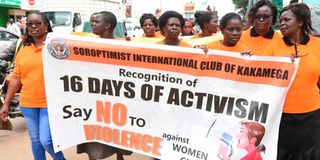Blame patriarchy, masculinity

Members of Soroptimist International Club of Kakamega match on the streets of Kakamega town to mark 16 days of activism against gender violence in December 2019.
What you need to know:
- Boys and men are taught early that they should exercise control and power in relationships.
- Internalised gender roles and stereotypes create gender power imbalances and propagate inequalities and GBV.
May is dedicated to ending teenage pregnancy worldwide. Kenya is far from achieving the goal, teenage pregnancy and sexual violence having been aggravated by the containment measures against Covid-19.
The Kenya Health Information Systems data shows health facilities recorded increased cases of teenage pregnancy last year. Nairobi led with 11,795, followed by Kakamega (6,686) and Homa Bay (5,961). The media has highlighted heartbreaking stories of adolescent girls and young women who are teenage mothers — some as young as 12.
On March 3 last year, the National Council for Population and Development launched the National Campaign to End Teenage Pregnancy, which sought to rally communities to end teenage pregnancy.
In a statement last month, the Gender ministry pointed out that a National Crime and Research Centre study linked drug and substance abuse, poverty and retrogressive cultural beliefs and practices to the increased gender-based violence (GBV) cases.
Toxic behavioral patterns
To end GBV and teenage pregnancy, let us address male entitlement over the female body and gender role. Boys and men are taught early that they should exercise control and power in relationships, women’s bodies are always available, women should not refuse sexual advances or deny a partner sex and women are sexual objects. Internalised gender roles and stereotypes create gender power imbalances and propagate inequalities and GBV.
Socialisation of boys and men play a key role in the development of self-concept, how they interact with girls and young women, what they do and how they handle situations. Society perceives boys as strong, providers, heroes, decision-makers and as having more sexual energy. This promotes the ideology of superiority and violent and toxic behaviour.
Let’s learn, relearn and unlearn toxic behavioral patterns that propagate injustice and cause oppression and sexism and call out patriarchy, dismantle male dominance and challenge gender roles.
Ms Kuboka, a reproductive health expert, is the founder of Youth Changers Kenya. [email protected]





